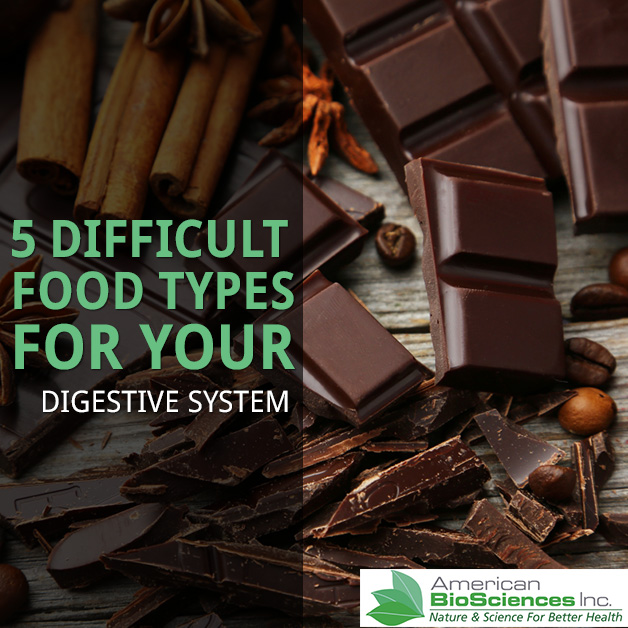
20 Jul 5 Difficult Foods for Your Digestive System
We’ve all been there: your digestive system flares up and causes you distress. This distress can rear its ugly head at the worst times, causing gas, constipation, bloating, and other symptoms that are truly uncomfortable. It can often be hard to figure out what is causing your digestive tract distress, as there are many factors, including food, that influence the entire picture. However, it is possible that having more stress in your life, or eating something that didn’t sit well with you, affects the overall behavior of your stomach and intestines. If you’re struggling to figure why your digestive tract always seems to be mad at you, take these five food types into account and see if they could be the cause of your distress.
Wheat/Gluten
There is a lot of talk about gluten in general, and probably for good reason. Not only does it have the possibility to cause inflammation in the body, but it’s also a difficult protein for the body to digest. This particular protein is closely related to dairy protein and our bodies don’t always have the right enzymes, or enough of them, in order to properly digest both gluten and cassinate.
In addition to gluten causing some individual’s digestive troubles, whole wheat can cause digestive distress for some individuals, because the body has to work harder to break down all the different components. This can lead to bloating and cramping, as the wheat product has to move all the way through the digestive tract in order to be broken down.
Lactose
Anywhere from 30 to 50 million Americans have a lactose intolerance, whether diagnosed or not. Lactose is the enzyme found in all animal milk products. It can be different sizes, depending on the mammal that produces that milk, and for many, it can cause gastric distress. This enzyme is exceptionally hard for the digestive system to process, especially for specific ethnicities. In fact, upwards of 75 percent of African Americans have some level of lactose intolerance.
Insoluble Fiber
Fiber is great for your overall health, but insoluble fiber can be tough on your digestive system. This can include many raw vegetables and grains. This is because the only part of the digestive tract that is geared to process insoluble fiber is the large intestine. The food goes through the system relatively unprocessed until the large intestine can start breaking it down. The good bacteria in the large intestine do much of the work and release a lot of gas in the process.
Chocolate
Many folks love chocolate, and typically that’s okay; but if your tummy had been bothering you, you might want to cut it out for a while. Chocolate is both acidic and a diuretic. This can cause any number of symptoms from heart burn to loose stool.
Cellulose
Cellulose is a fiber that is part of a plant’s anatomy, and consumed in reasonable quantities, it won’t cause any problems. However, in large quantities, like with the consumption of corn, you may run into some digestive issues. In fact, cellulose travels through the digestive tract relatively undigested, simply to be excreted.
There are certain specific cases when an individual struggles to digest just about everything, and this can often be caused by problems with the pancreas or other gut concerns. Digestive enzymes can be beneficial for individuals who struggle with difficulties digesting foods or any of the conditions that make digestion a challenge.
DIGESTSolve 24/7, by American BioSciences, helps to provide quality enzymes that breakdown difficult to digest foods in order for the nutrients to be more readily accessible for the body. Find out more about DIGESTSolve 24/7 online today!

